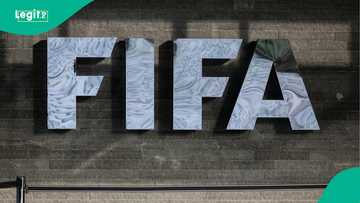- FIFA has announced a change in the football calendar, merging the September and October international windows
- Starting from 2026, countries will play four matches in September, none in October, and two in November
- Player welfare, travel concerns, and 2026 World Cup scheduling were the major factors behind the change
FIFA has announced a major change to the global football calendar, confirming that from 2026, the traditional September and October international breaks will be merged into a single, extended window.
This decision from football’s governing body comes days after Nigeria’s controversial World Cup qualifier against South Africa in Bloemfontein.
Source: Getty Images
The Super Eagles held Bafana Bafana to a 1-1 draw, three days after defeating Rwanda 1-0 at the Godswill Akpabio International Stadium in Uyo.
Neither result was good enough for Nigeria as the chance to qualify for the 2026 FIFA World Cup is now out of their hands, with Eric Chelle’s men now six points behind South Africa, who have 17 points from eight matches, per FIFA.com.

Read also
FIFA releases list of teams sanctioned in World Cup qualifiers amid South Africa’s debacle
Currently, international breaks occur in September, October, and November, with two matches played during each window.
Starting in 2026, the September break will run from September 21 to October 6, allowing teams to play four matches instead of two.
There will be no October break moving forward. The November window remains unchanged.
This move will reduce the number of disruptions to domestic leagues while still maintaining the same number of international matches.
FIFA’s goal is to streamline the schedule, minimise long-distance travel, and give players more consistent rest between matches.
Why was the change approved?
The FIFA Council, made up of representatives from all six confederations, signed off on the calendar shift back in March 2023, and several factors influenced the decision.

Source: Getty Images
One key reason is the 2026 World Cup final, which is scheduled for July 19, the latest summer final in over 50 years.
This later date compresses the football calendar and puts more strain on both clubs and players.
Extending the September break and eliminating October from the schedule reduces the number of separate disruptions to the various domestic leagues, BBC reports.
Player welfare also played a central role in the decision as FIFA consulted clubs, federations, and players’ unions before approval.
Players who compete across different continents, especially Africans and South Americans playing in Europe, often face hectic travel schedules.
A single, extended break reduces back-and-forth trips and offers better recovery time.
How will this change impact clubs?
With one fewer international window, there’s less congestion across the season for football clubs.
National teams will only lose players twice after the summer instead of three times, freeing up one more week for league or European competition matches.
For the Premier League, this means matches will continue until the weekend of September 19th to 20th in 2026, pause for the international window, and resume on October 10th to 11th.
During the break, international teams will play up to four matches. Importantly, there are no additional matches being added to the calendar. Teams will still play six matches during this period.
FIFA sanctions teams in World Cup qualifiers
In another development, Legit.ng reported that the world’s football governing body, FIFA, has released a list of more teams sanctioned in the 2026 World Cup qualifiers.
This comes amid concerns for South African fans after Bafana Bafana fielded an ineligible player against Lesotho.
Source: Legit.ng

